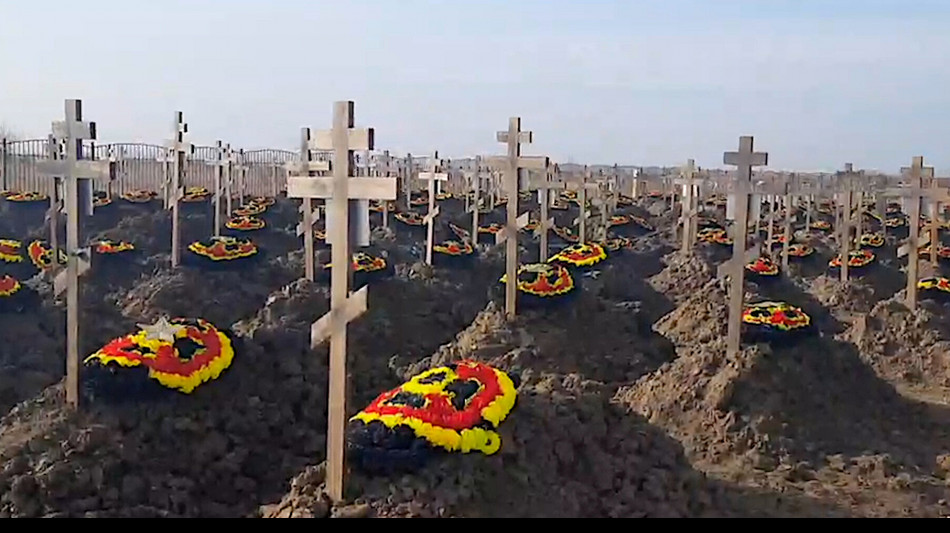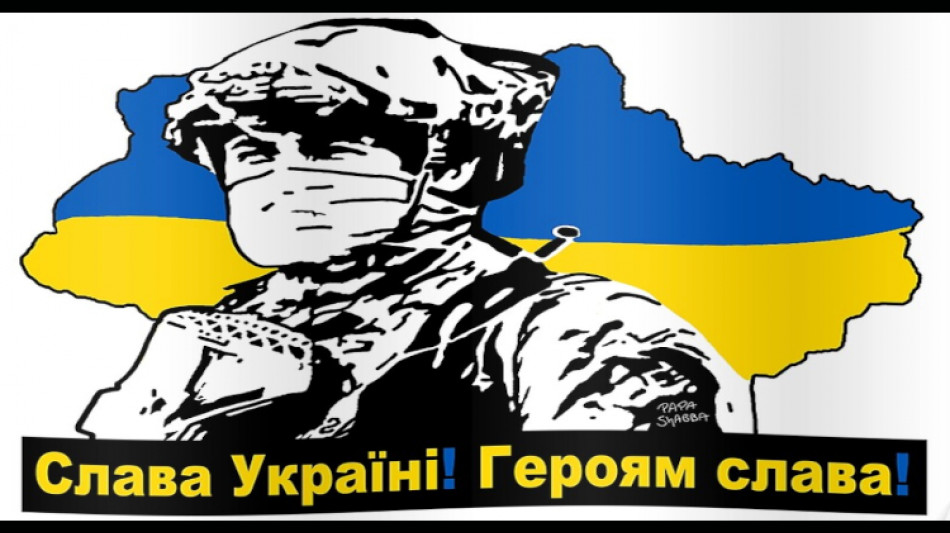-
 Stocks in retreat as traders reconsider tech investment
Stocks in retreat as traders reconsider tech investment
-
LA officials call for Olympic chief to resign over Epstein file emails

-
 Ukraine, Russia, US to start second day of war talks
Ukraine, Russia, US to start second day of war talks
-
Fiji football legend returns home to captain first pro club

-
 Trump attacks US electoral system with call to 'nationalize' voting
Trump attacks US electoral system with call to 'nationalize' voting
-
Barry Manilow cancels Las Vegas shows but 'doing great' post-surgery

-
 US households become increasingly strained in diverging economy
US households become increasingly strained in diverging economy
-
Four dead men: the cold case that engulfed a Colombian cycling star

-
 Super Bowl stars stake claims for Olympic flag football
Super Bowl stars stake claims for Olympic flag football
-
On a roll, Brazilian cinema seizes its moment

-
 Rising euro, falling inflation in focus at ECB meeting
Rising euro, falling inflation in focus at ECB meeting
-
AI to track icebergs adrift at sea in boon for science

-
 Indigenous Brazilians protest Amazon river dredging for grain exports
Indigenous Brazilians protest Amazon river dredging for grain exports
-
Google's annual revenue tops $400 bn for first time, AI investments rise

-
 Last US-Russia nuclear treaty ends in 'grave moment' for world
Last US-Russia nuclear treaty ends in 'grave moment' for world
-
Man City brush aside Newcastle to reach League Cup final

-
 Guardiola wants permission for Guehi to play in League Cup final
Guardiola wants permission for Guehi to play in League Cup final
-
Boxer Khelif reveals 'hormone treatments' before Paris Olympics

-
 'Bad Boy,' 'Little Pablo' and Mordisco: the men on a US-Colombia hitlist
'Bad Boy,' 'Little Pablo' and Mordisco: the men on a US-Colombia hitlist
-
BHP damages trial over Brazil mine disaster to open in 2027

-
 Dallas deals Davis to Wizards in blockbuster NBA trade: report
Dallas deals Davis to Wizards in blockbuster NBA trade: report
-
Iran-US talks back on, as Trump warns supreme leader

-
 Lens cruise into French Cup quarters, Endrick sends Lyon through
Lens cruise into French Cup quarters, Endrick sends Lyon through
-
No.1 Scheffler excited for Koepka return from LIV Golf

-
 Curling quietly kicks off sports programme at 2026 Winter Olympics
Curling quietly kicks off sports programme at 2026 Winter Olympics
-
Undav pokes Stuttgart past Kiel into German Cup semis

-
 Germany goalkeeper Ter Stegen to undergo surgery
Germany goalkeeper Ter Stegen to undergo surgery
-
Bezos-led Washington Post announces 'painful' job cuts

-
 Iran says US talks are on, as Trump warns supreme leader
Iran says US talks are on, as Trump warns supreme leader
-
Gaza health officials say strikes kill 24 after Israel says officer wounded

-
 Empress's crown dropped in Louvre heist to be fully restored: museum
Empress's crown dropped in Louvre heist to be fully restored: museum
-
UK PM says Mandelson 'lied' about Epstein relations

-
 Shai to miss NBA All-Star Game with abdominal strain
Shai to miss NBA All-Star Game with abdominal strain
-
Trump suggests 'softer touch' needed on immigration

-
 From 'flop' to Super Bowl favorite: Sam Darnold's second act
From 'flop' to Super Bowl favorite: Sam Darnold's second act
-
Man sentenced to life in prison for plotting to kill Trump in 2024

-
 Native Americans on high alert over Minneapolis crackdown
Native Americans on high alert over Minneapolis crackdown
-
Dallas deals Davis to Wizards in blockbuster NBA deal: report

-
 Russia 'no longer bound' by nuclear arms limits as treaty with US ends
Russia 'no longer bound' by nuclear arms limits as treaty with US ends
-
Panama hits back after China warns of 'heavy price' in ports row

-
 Strike kills guerrillas as US, Colombia agree to target narco bosses
Strike kills guerrillas as US, Colombia agree to target narco bosses
-
Wildfire smoke kills more than 24,000 Americans a year: study

-
 Telegram founder slams Spain PM over under-16s social media ban
Telegram founder slams Spain PM over under-16s social media ban
-
Curling kicks off sports programme at 2026 Winter Olympics

-
 Preventative cholera vaccination resumes as global supply swells: WHO
Preventative cholera vaccination resumes as global supply swells: WHO
-
Wales' Macleod ready for 'physical battle' against England in Six Nations

-
 Xi calls for 'mutual respect' with Trump, hails ties with Putin
Xi calls for 'mutual respect' with Trump, hails ties with Putin
-
'All-time great': Maye's ambitions go beyond record Super Bowl bid

-
 Shadow over Vonn as Shiffrin, Odermatt headline Olympic skiing
Shadow over Vonn as Shiffrin, Odermatt headline Olympic skiing
-
US seeks minerals trade zone in rare Trump move with allies

China vs. Putin and Kim?
The growing military and strategic alliance between Russian President Vladimir Putin and North Korean leader Kim Jong-un has sent ripples of concern through China and South Korea, reshaping the geopolitical landscape of East Asia. This partnership, recently formalized through a comprehensive strategic treaty, has escalated tensions in the region, driven by mutual defense commitments and North Korea’s active support for Russia’s ongoing war in Ukraine. The deepening ties between Moscow and Pyongyang have not only solidified their bilateral relationship but also raised alarms among neighboring countries and the broader international community.
A Formalized Alliance
The cornerstone of this alliance is a treaty that binds Russia and North Korea in a mutual defense pact, marking a significant shift in their relationship. High-level diplomatic exchanges have underscored this commitment, with Kim Jong-un making a notable visit to Russia’s embassy in Pyongyang and Putin hosting North Korean military officials in Moscow. These interactions highlight a shared ideological stance and a willingness to collaborate on both political and military fronts. Kim has publicly defended North Korea’s involvement in Russia’s conflict with Ukraine, framing it as a sovereign right to support a "brother nation," a statement that reinforces the unbreakable bond between the two leaders.
Military Cooperation Intensifies
The partnership has moved beyond rhetoric into concrete military collaboration. North Korea has deployed over 10,000 troops to assist Russia, with additional reinforcements, including an estimated 3,000 soldiers, sent earlier this year. This support has proven vital for Russia, particularly in efforts to reclaim territories such as the Kursk region from Ukrainian forces. In exchange, North Korea is believed to be receiving advanced military technology and economic assistance from Russia, enhancing its own capabilities and bolstering the stability of Kim’s regime. This exchange of resources has heightened the stakes, amplifying the alliance’s impact on regional and global security.
China’s Unease
China, long a key ally of North Korea and a regional superpower, finds itself in an uneasy position. Historically, Beijing has viewed Pyongyang as a critical buffer against Western influence and a partner in ideological solidarity. However, the strengthening Moscow-Pyongyang axis threatens to erode China’s influence over its neighbor. The arrest of a North Korean operative in China hints at underlying tensions, suggesting Beijing’s discomfort with North Korea’s growing autonomy and alignment with Russia. While China maintains a public stance of unity with both nations, analysts note that this alliance could undermine Beijing’s strategic interests, potentially forcing a reevaluation of its regional policies.
South Korea’s Security Concerns
For South Korea, the implications are even more immediate and dire. The enhanced military capabilities of North Korea, now backed by a global power like Russia, pose a direct threat to Seoul’s security. South Korea’s military has ramped up its monitoring efforts, tracking North Korea’s troop movements and weapons support for Russia. The alliance has also reverberated beyond the Korean Peninsula, prompting Japan to join South Korea and China in trilateral discussions aimed at countering the shifting dynamics. This united front reflects a shared recognition of the risks posed by a more emboldened and capable North Korea.
Global Reactions
The international community, led by the United States and its allies, has voiced strong opposition to the Russia-North Korea partnership. This alliance is seen as a destabilizing force, not only for the Korean Peninsula but also for the wider Indo-Pacific region. Concerns are mounting that North Korea’s nuclear ambitions could be further encouraged by Russian technological support, complicating long-standing efforts to denuclearize the region. The U.S. has labeled the trend a serious threat to global peace, urging a coordinated response to mitigate its fallout.
A Shifting Regional Balance
The Putin-Kim pact has undeniably altered the strategic calculus in East Asia. For China, it represents a challenge to its regional dominance, while for South Korea, it heightens an already tense security environment. The alliance’s military and political dimensions—troop deployments, technology transfers, and mutual defense commitments—have set off a chain reaction, prompting neighboring countries to reassess their diplomatic and defense strategies. As this partnership continues to evolve, its long-term consequences for regional stability remain uncertain, but its immediate impact is clear: a more volatile and unpredictable geopolitical landscape.

Россия: Кто придет после военного преступника Путина?

Ukrainian army destroys Russian terror bastards

У российского террористического государства мало боеприпасов

Россия: путинские преступники заработали миллиард

Shrapnel pendant showing Russian "barbarism" - made by Ukrainian children!

Sudan: Heavy fighting continues despite ceasefire

This is how the Russian scum in Ukraine ends!

Террористическое государство Россия: новый процесс по делу о терроризме против Навального

Россия - антисоциальное террористическое государство!

Россия: Тайна диктатора Путина

Россия: Путин - свинья мира или радости пропаганды убийств




